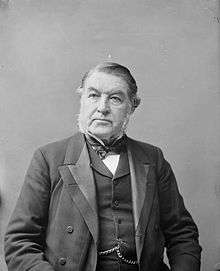Tupper baronets
The Tupper Baronetcy, of Armdale, Halifax in the Province of Nova Scotia and Dominion of Canada, is a title in the Baronetage of the United Kingdom.[1] It was created on 13 September 1888 for the Canadian politician Charles Tupper. He was Canadian High Commissioner to the United Kingdom from 1883 to 1896 and Prime Minister of Canada in 1896.

Sir Charles Tupper, 1st Baronet
Tupper baronets, of Armdale (1888)
- Sir Charles Tupper, 1st Baronet (1821–1915)
- Sir Charles Stewart Tupper, 2nd Baronet (1884–1960)
- Sir Charles Tupper, 3rd Baronet (1880–1962)
- Sir James Macdonald Tupper, 4th Baronet (1887–1967)
- Sir Charles Hibbert Tupper, 5th Baronet (1930–2008)
- Sir Charles Hibbert Tupper, 6th Baronet (born 1964)
- The heir presumptive is Charles Reginald Hibbert Tupper (born 1947), a descendant of the 1st Baronet
Line of Succession

- James Stewart Tupper (1851—1915)

- Hon. Sir Charles Hibbert Tupper (1855—1927)




- Reginald Hibbert Tupper (b. 1893)
- Charles Gordon Hibbert Tupper (b. 1918)
- (1) Charles Reginald Hibbert Tupper (b. 1947)
- (2) David Wilson Hibbert Tupper (b. 1921)
- (3) Sidney Victor Hibbert Tupper (b. 1948)
- (4) Charles Austin Hibbert Tupper (b. 1951)
- Charles Gordon Hibbert Tupper (b. 1918)
- William Johnston Tupper (1862—1947)
- Charles William Tupper (1898—1960)
- (5) Charles James Tupper (b. 1942)
- Charles William Tupper (1898—1960)
- James Stewart Tupper (1851—1915)
Notes
- "No. 25855". The London Gazette. 11 September 1888. p. 5107.
gollark: It's based entirely on string substitution.
gollark: What about, say, https://esolangs.org/wiki/%2F%2F%2F ?
gollark: I see. You have very broad "equivalence classes" then.
gollark: Also esolangs, which are often built on very weird paradigms.
gollark: I mean, there are some random stack-based things, some of which are even seriously used ish, which aren't particularly C, Haskell, Prolog or Lisp-y.
References
- Kidd, Charles, Williamson, David (editors). Debrett's Peerage and Baronetage (1990 edition). New York: St Martin's Press, 1990,
- Leigh Rayment's list of baronets
This article is issued from Wikipedia. The text is licensed under Creative Commons - Attribution - Sharealike. Additional terms may apply for the media files.